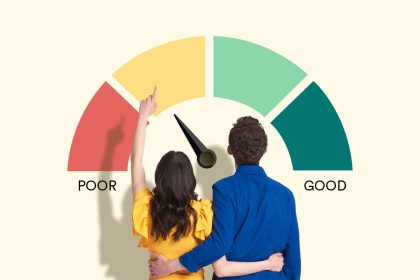MartinPrescott/Getty Images; Illustration by Austin Courregé/Bankrate
Key takeaways
- Making extra payments or picking up a side job are effective ways to pay off a personal loan faster.
- Tightening your budget or refinancing your loan can also help with early payoff.
- Check for any penalties or fees for paying off a loan early.
- Early payoff can save hundreds or thousands of dollars in interest.
With the new year arriving, it may be the perfect time to make “paying off debt” one of your resolutions. If you’re looking to pay off a personal loan more quickly, making extra payments or starting a side hustle are just two ways you could accomplish your goals. You could save hundreds — if not thousands — of dollars’ worth of interest over the life of a personal loan, especially if you’re stuck with a bad credit personal loan rate.
It’s important to consider your current savings situation and your monthly budget before you commit extra cash to clearing out debt. Knowing how each early payoff option works can help you choose one that won’t break the bank or put strain on your regular spending.
5 ways to pay off your personal loan faster
You can reduce your personal loan debt more quickly by paying, earning or saving more money to apply to your loan balance. Paying more may involve making regular extra payments or paying down one big chunk when you get extra cash. One caveat: Check with your lender to make sure there’s no penalty for paying your balance off faster.
Earning income from a side gig or temporary job can give you extra dollars to pay down your debt. You could also cut out some items from your budget or refinance your current personal loan to a lower rate. Each option has its own benefits and challenges depending on your current financial situation.
1. Make bi-weekly payments
A relatively easy way to pay your personal loan off faster is to set up bi-weekly payments. It may not seem like much, but every year you’ll end up making one extra full payment. Some lenders may arrange this for you free of charge, while others might assess a one-time setup cost.
This option won’t add a lot of extra financial burden or cost to your budget. You can use a bi-weekly payment calculator to do the math, or you can just divide your current loan payment in half and pay it every two weeks.
2. Pay extra when you get extra money
If you want to make bigger steps toward an early personal loan payoff date, apply larger payments to your principal when you receive extra cash. Use some or all of the funds received from a holiday cash gift, a year-end bonus or a tax refund to hack away at your loan balance.
Keep the following considerations in mind when deciding whether to use this method:
- You may need to contact your lender directly to make sure they apply the amount to your principal balance.
- Your payment won’t go down like it would if you paid down your balance on a credit card.
- Cover your most basic financial bases first. For example, if you don’t have at least $1,000 in an emergency fund, deposit cash to cover that before you apply a large amount to your personal loan balance.
3. Get a second job
If you have the time, finding extra income could be a good way to save up to pay off your loan early. Getting a side hustle doesn’t lock you into another scheduled job. You can try jobs with flexible hours — like babysitting, pet sitting, tutoring, food and grocery delivery, driving for Uber or countless other endeavors.
A recent Bankrate Side Hustle Survey found that roughly one-third (32 percent) of side hustlers say they think they will always need the money to make ends meet. If you’re in this category, you may want to continue making regular scheduled personal loan payments to avoid putting undue strain on your budget.
4. Revisit your budget
If you haven’t checked your monthly budget lately, take some time to review your spending over the past few months. Pay close attention to discretionary spending on eating out, movies and monthly subscriptions to see if there are places you could scale back.
If you haven’t opened up your car or home insurance statement lately, see if the premiums have increased recently. You could save significantly by switching to a company that offers discounts for new business or offers overall lower premiums than you realized.
5. Refinance your current personal loan
This may be a good option if your credit score has risen after taking out a bad credit debt consolidation loan. When you refinance a personal loan, you typically replace it with a new loan at a lower rate. You could save 10 to 20 percent on your APR if your credit score has increased into the good or excellent category.
You can also choose a shorter repayment term, but that will lock you into a higher monthly payment in most cases. However, lenders tend to offer lower personal loan rates for short terms.
Pros and cons of paying off a loan early
If you’re still on the fence about whether it makes sense to pay your personal loan off early, weighing the pros and cons side by side may help you make a final decision.
Pros
- You’ll pay less interest over the life of the loan.
- You’ll be debt free faster.
- You could reduce your payment with a lower refinance rate.
Cons
- You’ll use cash that could be used toward saving or investing.
- You may be charged a prepayment penalty.
- Your payment may increase if you refinance to a shorter term.
Frequently asked questions
-
Whether or not an early payoff is good depends on a few factors. It’s likely a good choice if you don’t have to pay a penalty and you don’t spend all of your savings doing so. Also, if you have credit cards, pay those off first. Carrying high credit card balances does much more damage to your credit scores than a personal loan in good standing.
-
Paying off loans early could cause a small dip in your score if you don’t have any other installment loans, like a car loan. However, if you have a healthy mix of accounts, including credit cards and installment loans, the drop should be small.
-
Make extra payments when you can or refinance to a lower rate or shorter-term loan. Just watch out for fees and prepayment penalties that could add to your total loan cost.
-
The more you pay each month, the faster you’ll pay off your personal loan balance. You can use an extra payment calculator to get an idea of how each added payment will take you closer to the payoff finish line.
Read the full article here





